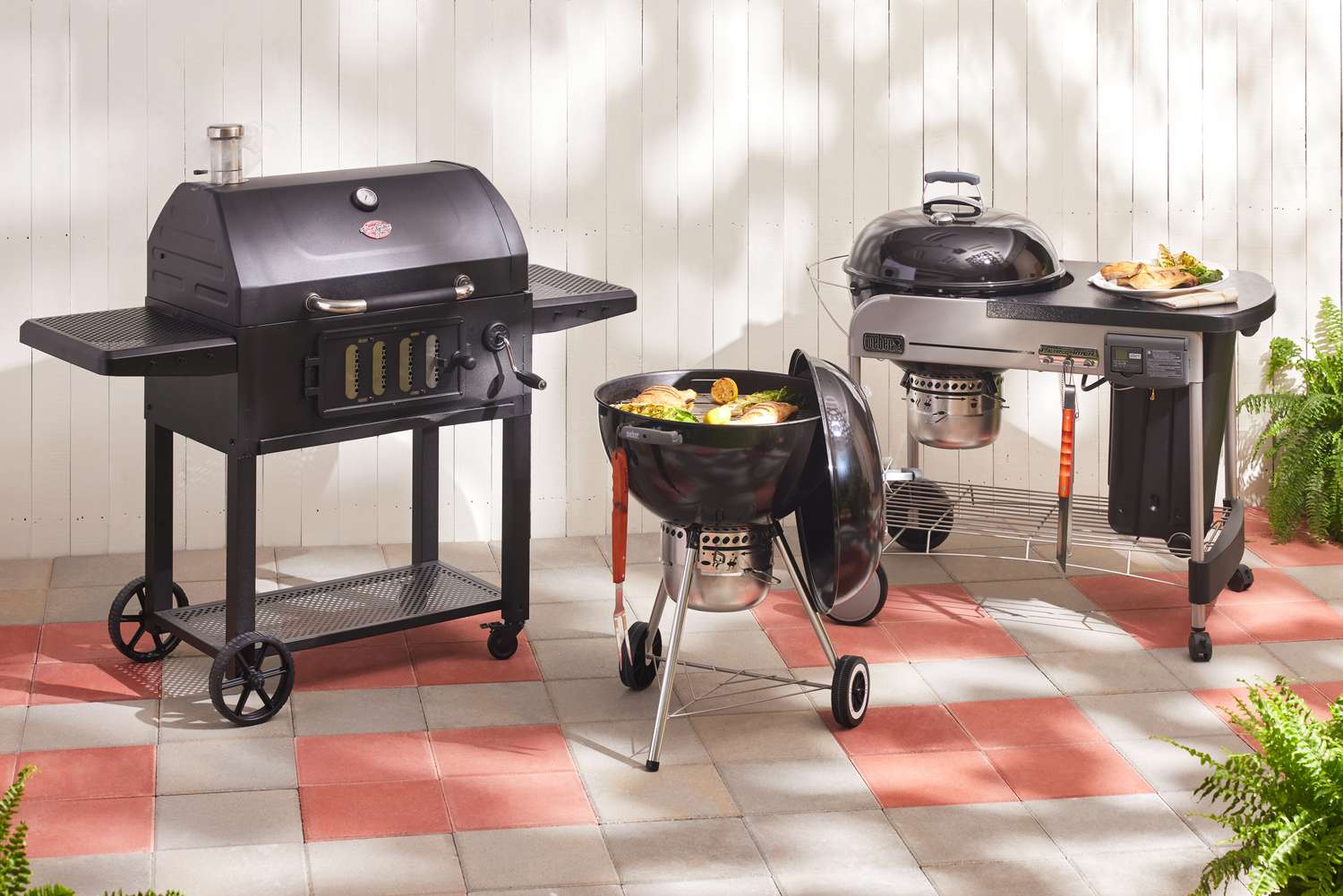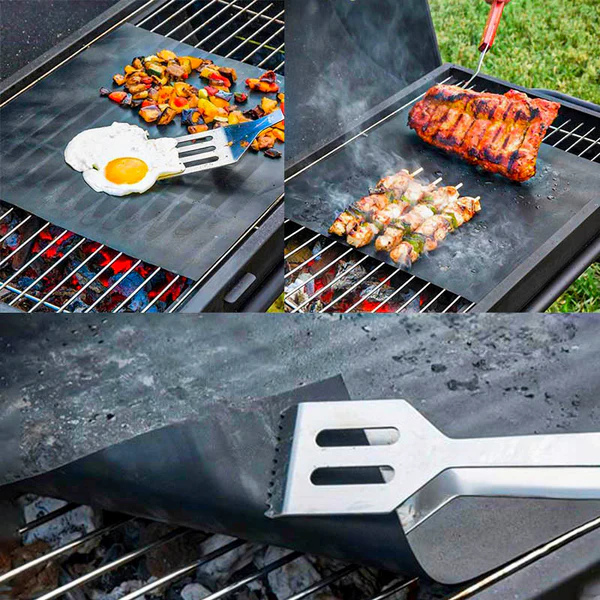Gas vs Charcoal vs Electric Grills – An Expert Perspective
Grilling isn’t just a cooking method; it’s a beloved tradition, a social gathering, and a celebration of mouthwatering flavors. Whether you’re a casual weekend griller or a seasoned pitmaster, selecting the right grill can elevate your BBQ game. Today, we’re diving into the classic showdown: Gas vs. Charcoal vs Electric Grills. We’ll break down the pros and cons of each type, so you can choose the perfect grill for your next cookout.
Picking the right grill is essential for any BBQ lover. Gas, charcoal, and electric grills each have their own unique advantages and challenges that can shape your grilling experience. From the convenience and precision of gas grills to the rich, smoky taste of charcoal, and the city-friendly practicality of electric grills, knowing the differences will help you find the ideal fit for your grilling needs.

What is a BBQ Grill?
A BBQ grill, short for barbecue grill, is a device made for cooking food using heat from below. It’s the heart of outdoor cooking and is closely tied to social gatherings like backyard cookouts and summer parties. The word “barbecue” has deep historical roots, believed to come from the Caribbean term “barbacoa,” which the Taino people used to describe a wooden structure for cooking food over an open fire.
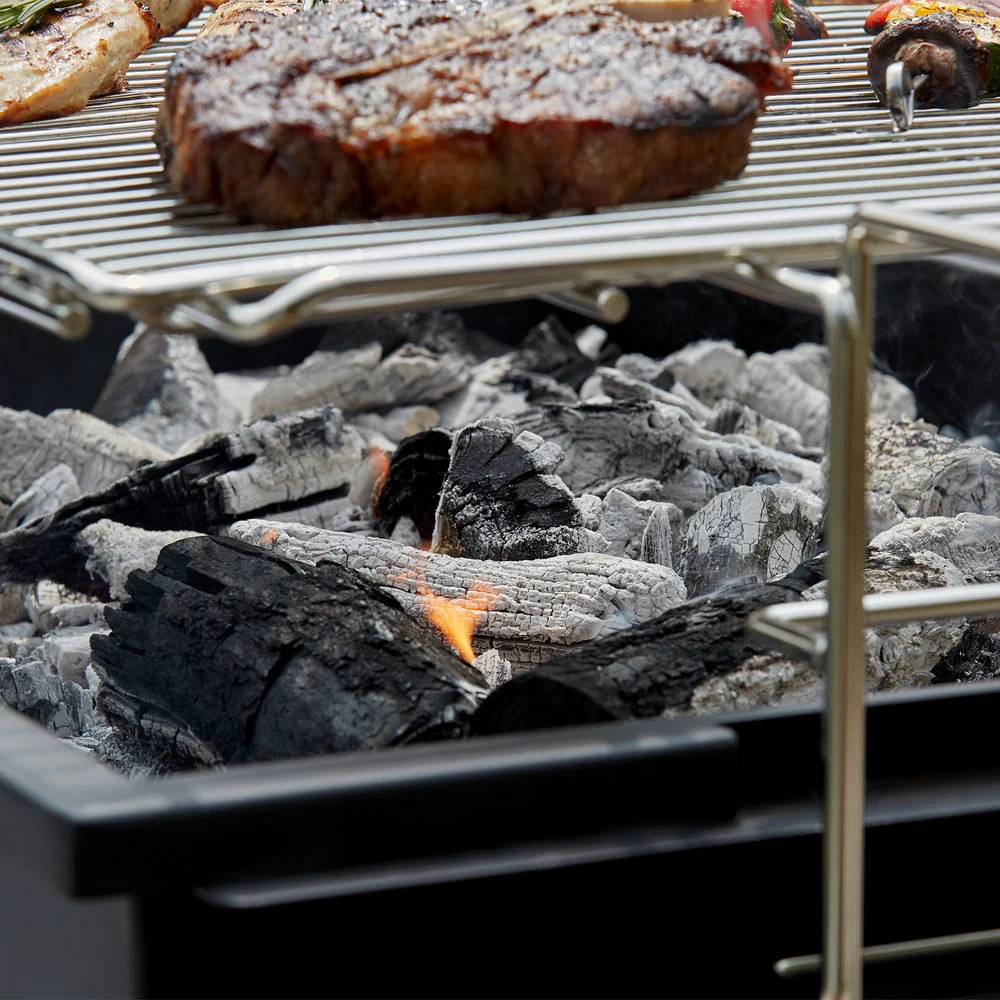
There are three primary types of BBQ grills: charcoal, gas, and electric, each defined by the heat source they use to cook food.
Charcoal Grills: These grills rely on charcoal briquettes or lump charcoal as both fuel and ignition source. They’re famous for delivering that distinct smoky flavor, a favorite among BBQ enthusiasts. Charcoal grills come in various designs, like kettle or barrel styles, each offering a unique grilling experience.
Gas Grills: Powered by either propane or natural gas, gas grills are known for their convenience and precise temperature control. Popular for their ease of use, these grills often include features like side burners, rotisseries, and multiple cooking zones to enhance the grilling experience.
Electric Grills: Electric grills use heated grill plates and are powered by plugging into an electrical outlet. They’re ideal for situations where outdoor grilling isn’t possible, such as in apartments or condos with space restrictions or regulations. Typically the smallest option, electric grills are prized for their simplicity and convenience.
All three grill types position the heat source below the cooking grate, allowing for either direct grilling (where food is placed directly over the heat) or indirect grilling (where food is cooked off to the side without direct heat). This variety in grill types caters to a wide range of cooking styles, ensuring there’s something for everyone.
GAS GRILLS: The Connoisseur’s Choice
A top choice among discerning gentlemen, gas grills are known for their convenience, speed, and control. These grills work with either propane tanks or natural gas lines, offering quick and easy ignition and rapid preheating.
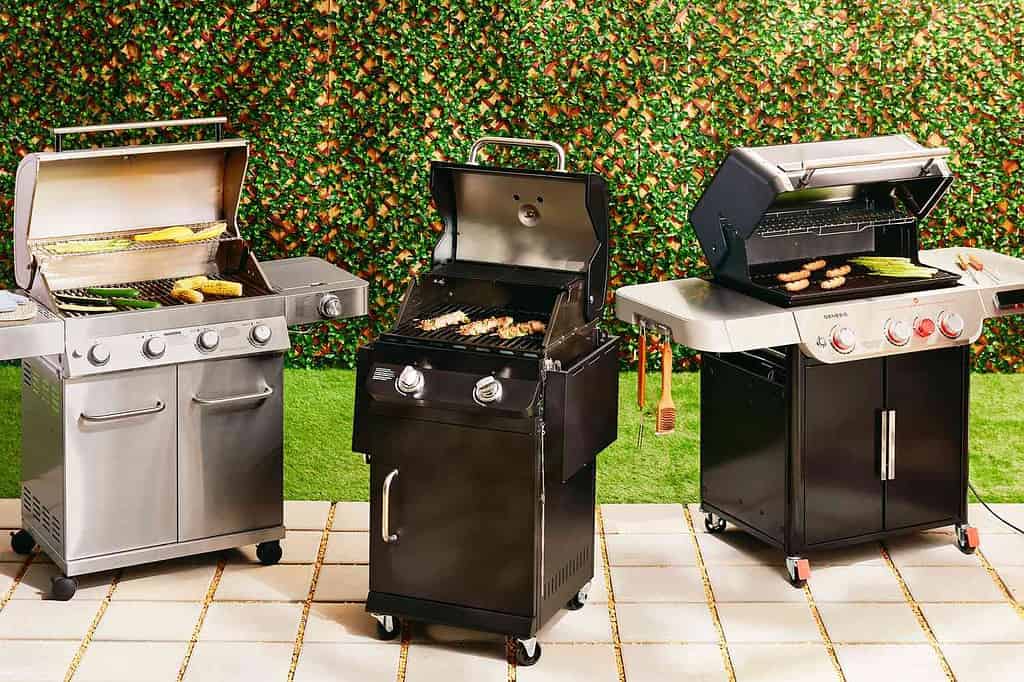
Pros and cons:
Pros:
- Ease and Speed: Gas grills are almost effortless to start and require little pre-heating time, typically 10 to 15 minutes. Perfect for impromptu grilling sessions or when time is of the essence.
- Temperature Control: They offer precise control over heat, with knobs similar to your kitchen stove. Ideal for cooking different cuts and types of meat that require exact temperatures.
- Cleanup: They are relatively easy to clean, with no ashes to worry about.
- Versatility: Many gas grills come with added features like side burners, warming zones, and rotisseries.
Cons:
- Flavor: The most significant trade-off with gas grills is the lack of smoky flavor that charcoal grills offer.
- Cost: Gas grills tend to be more expensive initially compared to charcoal grills, though the ongoing cost can be less, especially with natural gas.
- Portability: Propane gas grills can be moved around, but if you’re using a natural gas line, your grill is more or less stationary.
Ideal Scenarios for Gas Grills:
Gas grills are ideal for frequent grillers who prioritize convenience, control, and easy cleanup. Their versatility and quick start-up make them great for hosting gatherings. Add a glass of smooth bourbon to the mix, and you’ve got the recipe for a perfect evening.
CHARCOAL GRILLS: The Traditionalist’s Delight
Charcoal grills, the original grilling method, remain wildly popular for one reason: flavor. The smoky, rich taste that a charcoal grill imparts to the meat is unrivaled.
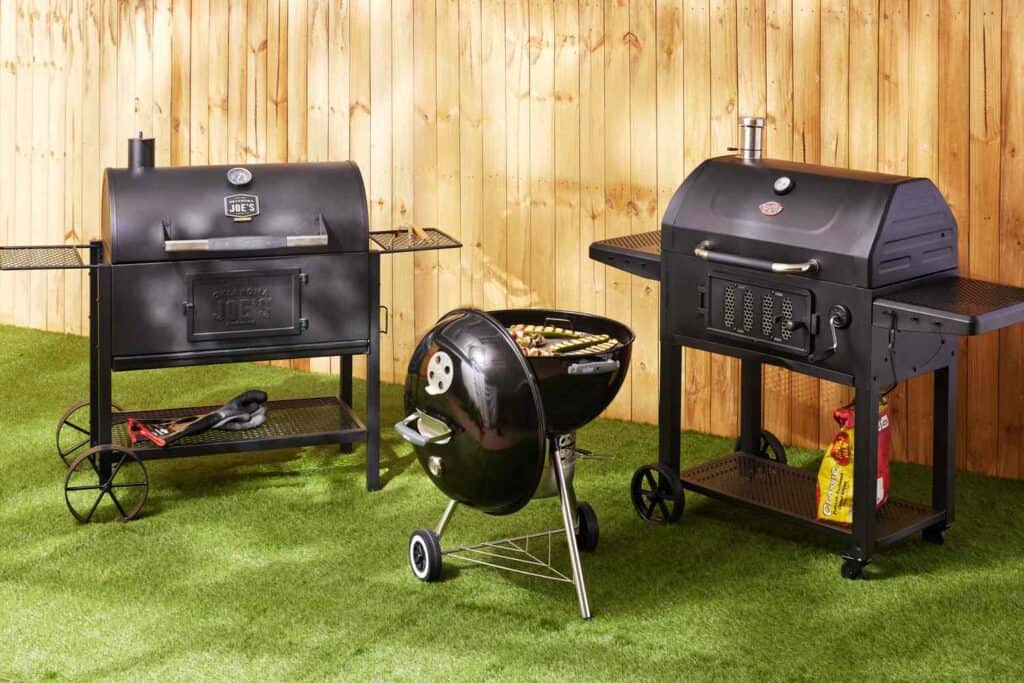
Pros and Cons
Pros:
- Flavor: Charcoal grills offer that classic, smoky flavor that barbecue enthusiasts swear by.
- Heat: Charcoal can achieve higher heat than gas, ideal for searing meats to perfection.
- Cost: Charcoal grills are generally cheaper than gas grills in terms of initial investment.
- Portability: Charcoal grills come in various sizes, including compact options that are perfect for camping or tailgating.
Cons:
- Time-Consuming: Starting a charcoal grill and getting it to the right temperature takes time and practice.
- Temperature Control: Controlling heat in a charcoal grill is trickier and requires experience.
- Cleanup: Post-grill cleanup can be a bit messy with the ashes.
Ideal Scenarios for Charcoal Grills:
For those who crave that authentic smoky flavor, a charcoal grill is the way to go. It’s a more hands-on experience, demanding both skill and patience, but the flavorful results make it all worthwhile.
ELECTRIC GRILLS: The Modernist’s Preference
Compact, convenient, and smoke-free, electric grills are the new kids on the block. Ideal for those with space constraints or strict community rules, these grills bring the joy of grilling to apartments and condos.
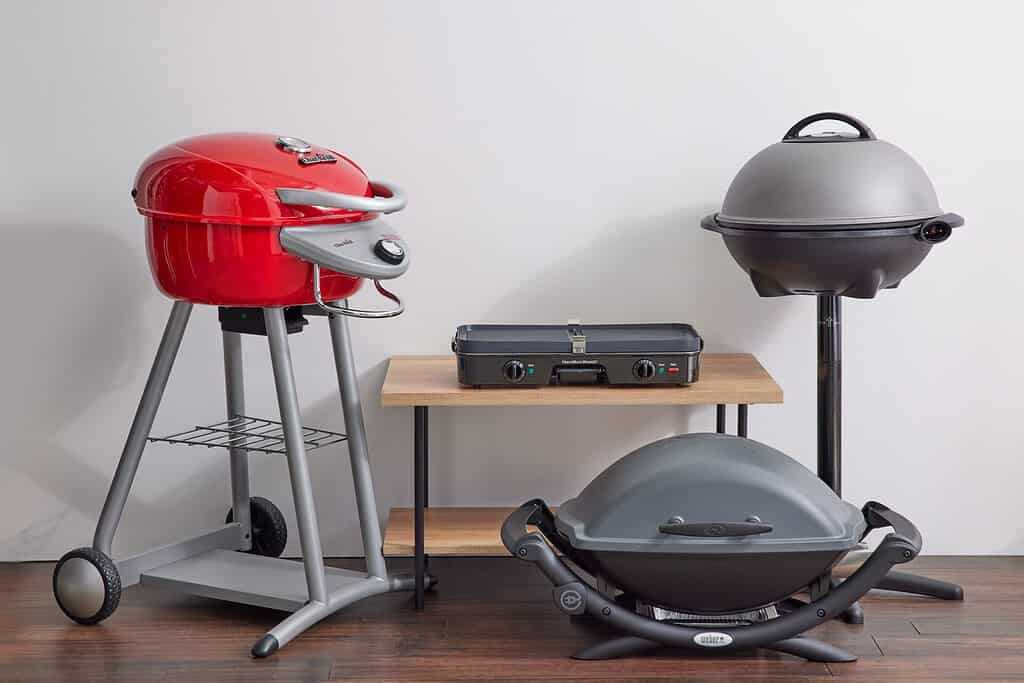
Pros and Cons
Pros:
- Convenience: Simply plug it in, and you’re ready to grill. No worries about propane tanks, charcoal, or ash.
- Compact and Portable: Electric grills are typically smaller, perfect for balconies or small patios.
- Smokeless: Electric grills produce very little smoke, making them ideal for indoor grilling or places with strict fire codes.
Cons:
- Flavor: Electric grills do not impart the smoky flavor that gas or charcoal grills do.
- Heat: They usually don’t reach the same high temperatures as gas or charcoal grills.
- Dependency on Electricity: You need a power outlet nearby to operate, which could limit where you can use it.
Ideal Scenarios for Electric Grills:
Electric grills are ideal for city dwellers in condos or apartments where space is tight and fire regulations may restrict the use of gas or charcoal grills. They’re also a great option for indoor grilling on rainy days, ensuring your BBQ plans aren’t spoiled by the weather.
Making Your Choice
- For Flavor Enthusiasts: If you’re all about that rich, smoky taste and enjoy the hands-on experience of managing the coals, a charcoal grill is your best bet for delivering authentic BBQ flavor.
- For Convenience Seekers: Gas grills offer the perfect blend of ease and performance, with quick ignition, precise temperature control, and a range of features that make grilling a breeze.
- For Urban Dwellers: If you’re limited by space or fire regulations, an electric grill is the way to go. They’re simple to use, safe, and require minimal cleanup, making them perfect for city living.
Each grill type has its own strengths, so think about your lifestyle, how often you grill, and your taste preferences before making your choice. Whether you’re searing steaks or slow-cooking ribs, there’s a grill out there that’s perfect for you.
Disclosure: Our blog contains affiliate links to products. We may receive a commission for purchases made through these links. However, this does not impact our reviews and comparisons. We try our best to keep things fair and balanced, in order to help you make the best choice for you.

